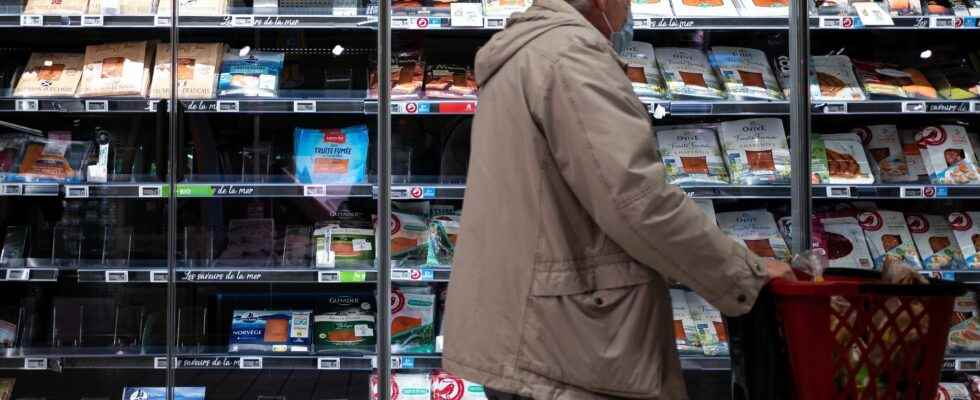The expression is echoed in all mouths. Will there be a “red march”, which would see food prices soar even more? Supermarkets’ annual negotiations with their suppliers, due to be concluded by March 1 at the latest, are particularly tense this year. The reason: an inflationary context (energy, transport or raw materials) which weighs on the margins of all players. Thus, production prices have increased much more than consumer prices.
During these negotiations, the manufacturer must submit the prices to the distributors, who decide whether or not to accept them. The surge in labels is gradually reflected on the shelves, while the various players pass the buck. According to forecasts by the firm NielsenIQ quoted by AFP, the price of food products sold in stores could increase by 15% in June 2023 compared to June 2022.
It should be noted that these negotiations concern all products with so-called “national” brands (Danone, Lu, Mondelez, etc.). Those of distributor brands (Brand Repères, Produits U or Carrefour, etc.) are excluded. For them, negotiations take place throughout the year. However, they represent a third of the products in supermarkets, which could limit this “red march”.
The expression was democratized by the journalist specializing in consumption, Olivier Dauvers. On February 22, he said at the microphone of BFM TV : “All these negotiations will result in price increases, since new tariffs will come into force, because the manufacturers themselves have cost increases. From March 1, there will be this repercussion as and when as deliveries are made.” On the side of the top of the State, we are trying to put out the fire. This Saturday, February 25, Emmanuel Macron, visiting the Salon de l’Agriculture, considered that “those who must make an effort on their margins are the distributors”, considering that the producers had done their part given the explosion of their costs.
Price increases “which will be spread over time”
A few days before, the Minister of the Economy Bruno Le Maire assured that there was “no reason” for food prices to ignite in March. “I don’t know if (the result of the discussions) will be an anti-inflation basket”, he added, opening the door to the abandonment of this “basket” made up of products from around fifty categories “at the best ratio price quality”. “It will be what distributors will find most useful and effective.” On February 23, it was Gabriel Attal, Minister Delegate in charge of Public Accountswho asserted on France info that enormous pressure was being put on to contain price increases as much as possible. “We have put in place measures to limit the price increase at the source,” he defended. On the set of RMCJean-Philippe André, president of the national association of food industries, also tried to reassure on February 19: “There will not be a 20% increase in food. There will be no shock of ‘inflation.”
On the distributors’ side, the president of the Système U brand, Dominique Schelcher, judged on Tuesday February 21 that it was “exaggerated” to speak of a “red march” for the inflation of products in supermarkets, because the increases prices “will be spread over time”, he explained on Classic Radio. Same story with one of its competitors: “It’s not March that will be red but the second quarter” 2023 in view of the prices requested by agro-industrial suppliers, indicated Thursday on BFM / RMC Michel- Edouard Leclerc, president of the strategic committee of the E.Leclerc centers, leader in food distribution in France (ahead of Carrefour). The price increases will “be passed on until July, because it takes four or five months” for them to come down on the shelves of supermarkets, he added.
Large retailers point the finger at agro-industrial suppliers
If prices don’t soar all of a sudden, “consumers will still see a lot of increases,” he said. Michel-Edouard Leclerc denounced, like his colleagues in the mass distribution, the “enormous increases” demanded by their agro-industrial suppliers, giving as an example the rise in the price of sugar, which according to him has increased by 22% compared to the previous year, and for which a supplier requested “53.82% more than last year”. Like every year, supermarkets and their agro-industry suppliers must agree on the prices and conditions of sale of pasta, steaks or other yogurts, which will then be marketed on the shelves.
Only one in two industrialists has so far signed all their contracts with their distributor customers, an unusually low rate one week before the close, the main food industry organization told AFP on Wednesday. There is also a risk of conflicts between distributors and manufacturers who will not be able to complete their negotiations. These will end with the mediator of the Republic, which can take a month. In reality, it will not be March that will be red, but all the months that follow.
